Gran Torino
 for language throughout, and some violence.
for language throughout, and some violence.
Reviewed by: Daniel Thompson
CONTRIBUTOR
| Moral Rating: | Very Offensive |
| Moviemaking Quality: |
|
| Primary Audience: | Adults |
| Genre: | Action Drama |
| Length: | 2 hr. 5 min. |
| Year of Release: | 2008 |
| USA Release: |
December 12, 2008 (LA/NYC) December 19, 2008 (Chicago/San Francisco/Toronto) December 25, 2008 (expanded) January 9, 2009 (wide—2,300 theaters) |
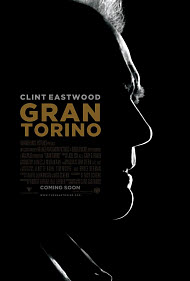

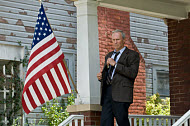
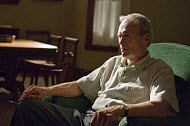
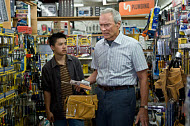
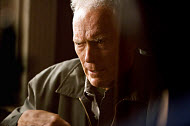


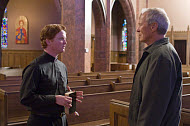
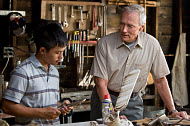

What are the consequences of racial prejudice and false beliefs about the origin of races? Answer
How can I be and feel forgiven? Answer
If God forgives me every time I ask, why do I still feel so guilty? Answer
Why does God allow innocent people to suffer? Answer
What kind of world would you create? Answer
What about the issue of suffering? Doesn’t this prove that there is no God and that we are on our own? Answer
Does God feel our pain? Answer
The Origin of bad—How did bad things come about? Answer
| Featuring |
|---|
| Clint Eastwood, Christopher Carley, Bee Vang, Ahney Her, Brian Haley, Geraldine Hughes, Dreama Walker, Brian Howe, John Carroll Lynch, William Hill, Brooke Chia Thao, Chee Thao, Choua Kue, Scott Eastwood, Xia Soua Chang, Sonny Vue, Doua Moua, Greg Trzaskoma, John Johns, Davis Gloff, Tom Mahard, Cory Hardrict, Nana Gbewonyo, Arthur Cartwright, Austin Douglas Smith, Conor Liam Callaghan, Michael E. Kurowski, Julia Ho, Maykao K. Lytongpao, Carlos Guadarrama, Andrew Tamez-Hull, Ramon Camacho, Antonio Mireles, Ia Vue Yang, Zoua Kue, Elvis Thao, Jerry Lee, Lee Mong Vang, Tru Hang, Alice Lor, Tong Pao Kue, Douacha Ly, Parng D. Yarng, Nelly Yang Sao Yia, Marty Bufalini, My-Ishia Cason-Brown, Clint Ward, Stephen Kue, Rochelle Winter, Claudia Rodgers, Vincent Bonasso |
| Director |
|
Clint Eastwood |
| Producer |
| Double Nickel Entertainment, Gerber Pictures, Malpaso Productions, Media Magik Entertainment, Village Roadshow Pictures, Warner Bros., Clint Eastwood, Bill Gerber, Jenette Kahn, Robert Lorenz, Tim Moore, Adam Richman |
| Distributor |
I can remember vividly a time as a young kid when I was riding to lunch with my grandfather in the small town of Camden, South Carolina, and getting pulled over by the police. As the police started coming to the car, I was scared to death. But as I looked over at my grandfather, he just smiled as he spit his chewing tobacco out the window. It turned out that we weren’t in trouble, but the police officer wanted to purchase my grandfather’s 1974 Ford Ranchero Squire. Not only was the car my grandfather’s prized possession, but it was also a good portrayal of him: tough as nails, strong as an ox, and one of a kind.
Similar to my grandfather is Walt Kowalski (Clint Eastwood), the main character in “Gran Torino.” Walt’s a tobacco chewing, chain-smoking Korean War vet and a no nonsense kind of guy. His pride and joy is a 1972 Ford Gran Torino. He doesn’t do well with change, including the changes his neighborhood is going through. What used to be a white suburban Michigan neighborhood is now one filled with multi-racial gang wars and a predominantly Asian community. Walt is too stubborn to move, and now that his wife is gone, it’s just him and his dog Daisy, left to sit on the porch, drink beer, and grumble under his breath about his neighbors.
Things change, however, when Walt catches someone trying to steal his Gran Torino. That someone is next door neighbor Thao, a teenage boy who’s being initiated into a gang. It’s through this incident that Walt finally connects with those in his neighborhood. Walt takes it upon himself to keep Thao out of the gang and out of trouble. An unlikely friendship begins to develop between Thao and Walt.
From that friendship comes an inspiring, redemptive, sometimes funny, and heartfelt film by Clint Eastwood. The film chronicles a man realizing the mistakes he’s made in his life and finding his way to come to terms with them and accept forgiveness. It also does a great job of showing to viewers who didn’t grow up with a grandfather, like mine, a realistic portrayal of the generation of Walt Kowalski: hard working, good hearted, but rough around the edges.
There are many great qualities and teachable moments in “Gran Torin,o” but it does come with a price. The film is rated “R,” mainly for its very strong language, as well as some violence. There are over 100 profanities in the film, and while that is clearly a lot, it’s founded in realism. The majority of the language comes from the various gangs in the neighborhood, as well as Walt himself. Along with the profanities, one of the central themes of the film is racism. Racial slurs come flying out of Walt’s mouth all movie long, and while this isn’t appropriate, the film does put into context that Walt uses these slurs just as much with his friends (his barber) as he does with people he doesn’t like. It’s seen more of as a generational gap than anything overly mean-spirited. It’s also the way that Walt keeps others at arms distance, and once the neighborhood realizes this, they ignore the comments and befriend him anyway.
Because of my relationship with my grandfather, this movie really hit home for me, and it will definitely do the same for those with similar experiences growing up. Clint Eastwood has made a film that is sometimes hard to watch. It’s rough, realistic, but ultimately redemptive. Just like my grandfather, the lead character, and the car itself, “Gran Torino” is tough as nails, strong as an ox, and one of a kind.
Violence: Heavy / Profanity: Extreme / Sex/Nudity: Mild
What are the consequences of racial prejudice and false beliefs about the origin of races? Answer
Get biblical answers to racial hot-topics. Where did the races come from? How did skin color come about? Why is it important to have a biblical foundation for such issues? Go
See list of Relevant Issues—questions-and-answers.


Moral rating: Very Offensive / Moviemaking quality: 5
I didn’t expect a comedy, though I should have known, considering one of my favorite movies is “Heartbreak Ridge.” In it, Clint Eastwood plays an ol’ crusty gunnery sergeant on the verge of retiring from the Corps; he busts chops but earns respect with his last platoon and goes out in a bang in this 80’s dramedy classic. “Gran Torino” is sorta similar. Crusty ol’ man on the precipice of the final retirement—swears a lot, loves to throw down, etc. This movie works because Eastwood is as virile as ever, both in speech and sheer prowess, and proves yet again he’s a bad mamma jamma.
Moral rating: Offensive / Moviemaking quality: 4½
The supporting casts ranges from the familiars like Brain Howe (“The Pursuit of Happyness”), Brian Haley (“The Departed”), John Caroll Lynch (“Gothika”) to Christopher Carley (“Lions For Lambs”) while the majority of all the Hmong characters are new comers with no or very little acting credits. Carley is passable as the young parish priest, Father Janovich, who tried to get through to the grumpy Walt while both the young leads of the Hmong protagonists, Bee Vang and Ahney Her did their best without prior acting experiences. Vang is stilted but Her comes with a likable presence and I can see a future for Her in films.
Overall, Eastwood rightfully deserved an Oscar® nod while the film is a major stepping stone for future Hmong actors. For me being Hmong, myself, although “Gran Torino” is filled with profanities from just about every angle on racism, I found the film to be positive in a wonderful kind of way. Also, I have converted from the old religion of my people, Walt’s reluctance with Father Janovich’s approach, in the end, I believe he has found peace.
This is a strictly R rated movie therefore, it is highly recommended for mature audience.
Moral rating: Better than Average / Moviemaking quality: 4½
Moral rating: Excellent! / Moviemaking quality: 4½
Moral rating: Excellent! / Moviemaking quality: 4½
Truth is not something sugar-coated or clean, but today’s society has made it seem that way. Everyone gets a trophy, and everyone becomes a doctor or a lawyer; failure is not discussed. I used to be happy when someone made a racial remark, because I knew where they stood, but today they smile at me and just do something vindictive behind my back.
I asked myself at the end of the movie, was Walt trying to atone for the bad things in his life? His wife, who we never meet, obviously was the one who noticed the changes in the neighborhood and embraced these changes for the better. I got a sense at the end of the movie that Walt fell in love with the people on his block and especially his neighbors. I loved the neighbors, especially the grandmother.
Freedom is not free, and the price keeps going up, but, for those who believe, your debt has been paid in full, no matter what the price. This is a movie that someone who is prejudiced (we all are) and that person they are prejudiced towards—go together. I challenge any of you to take the uncomfortable steps of reaching out to someone who makes you feel a little indifferent and share the Good News.
Moral rating: Extremely Offensive / Moviemaking quality: 5
The theme of this movie is that he is still living in a war, a war of his mind for peace, a war in his soul for forgiveness and a war over his identity, his tolerance of others, and his life. This story is one of redemption and in order to see the light the darkness must be revealed in an honest raw way.
I do not like using the Lord’s name, but,in perspective, he was at war with God as well, and made peace, I believe. The priest was an interesting character, how he pursued Clint Eastwood like God pursues us. He had an interesting transformation, as well, in the movie. As a young priest right out of the seminary, like a green soldier right out of boot camp, following all his training to a tee. But Clint Eastwood seems to bring out the man in him, and in a way seems to teach him that the “boot camp” is good training, but when you are in the trenches, your job is to survive, and you will do whatever it takes. I think that is why we see the priest, letting his priestly guard down a bit when faced with the ugliness of life.
Good movie—I could go on forever. I believe God could really use this movie to open people up to releasing the sins of their past that haunt them.
Moral rating: Very Offensive / Moviemaking quality: 4½
KUDOS to Clint for directing a wonderful film. My mom and dad both loved Clint Eastwood—acting and films. I think he is a wonderful director, as well as actor. Thank you for a “reality Check.” AWESOME FILM. IF you don’t want to hear the swear words, don’t watch it. Other than that, it is an extremely good movie.
Moral rating: Extremely Offensive / Moviemaking quality: 5
I recommend this film to all adults, and I have no problems with it’s portrayal of reality. I know it felt severely out of place for the priest to act the way he did in this movie, but priest are human just like the rest of us, and his behavior made me feel like this was very realistic.
Moral rating: Offensive / Moviemaking quality: 3
Moral rating: Better than Average / Moviemaking quality: 4
Moral rating: Average / Moviemaking quality: 4
Actually, when going to watch this movie, I was expecting the regular Clint, some action, guns, good lines, and hopefully the good guys taking care of the bad ones. I was not disappointed, although in a different way, as finally the movie offers much more. On the contrary to the movies listed before, this time Clint surprises us with a story of repentance and an unexpected ending (when we think of Clint´s trajectory).
Filmmaking is not great, but that is not the point with this movie (***spoilers ahead***): It is actually a story of reconciliation, of friendship, of forgiveness, of repentance, of love, and love to the end, just as the Lord: “No one has greater love than this, to lay down one’s life for one’s friends” (John 15:13). When we expect Clint to pull out his gun, he really takes out the strongest weapon of all: real love, the only one that can really make a difference.
Its Catholic background makes it a movie hard to understand for non-Catholics, as seen in some of the negative comments. But please do not stop because of the swearing—get real, that´s life if you´re not an Amish—and lose the chance to see Clint with a final Christian answer after a lifetime of the opposite.
Moral rating: Good / Moviemaking quality: 3½
Moral rating: Average / Moviemaking quality: 5
Moral rating: Excellent! / Moviemaking quality: 4
Moral rating: Offensive / Moviemaking quality: 5
Moral rating: Average / Moviemaking quality: 2½
none
The film contained a lot pertaining to Catholicism (which I disagree with on many facets), and the film featured a Hmong shaman who “reads” Clint Eastwood’s character. Clint’s character seemed very anti-god and anti-church. As I watch our nation in moral, spiritual, and economic decline, I could sympathize with the “old school” character that Clint played. I sometimes grieve for our nation when I look back at how God blessed this nation, and then I look at what it has become—at what we have become. I gave this film a negative because it should be extremely offensive to all Christians, if you are walking in the spirit.
Moral rating: Extremely Offensive / Moviemaking quality: 3½
Moral rating: Very Offensive / Moviemaking quality: 2
Moral rating: Very Offensive / Moviemaking quality: 3
The language is bad but its real. Gangs talk like that. “Gran Torino” is a superb movie that needs to be seen by everyone.
Moral rating: Good / Moviemaking quality: 4½
Moral rating: Extremely Offensive / Moviemaking quality: 3½
Moral rating: Offensive / Moviemaking quality: 5
Moral rating: Average / Moviemaking quality: 5
Ignoring the profanity though, this movie was very well-made and had a great story. I really grew to like some of the characters—and I was surprised at the end. I would recommend this movie to anyone who is not offended by profanity: the storyline is great, and there really is not much violence and absolutely no sex.
Moral rating: Offensive / Moviemaking quality: 4½


My Ratings: Moral rating: Offensive / Moviemaking quality: 4½